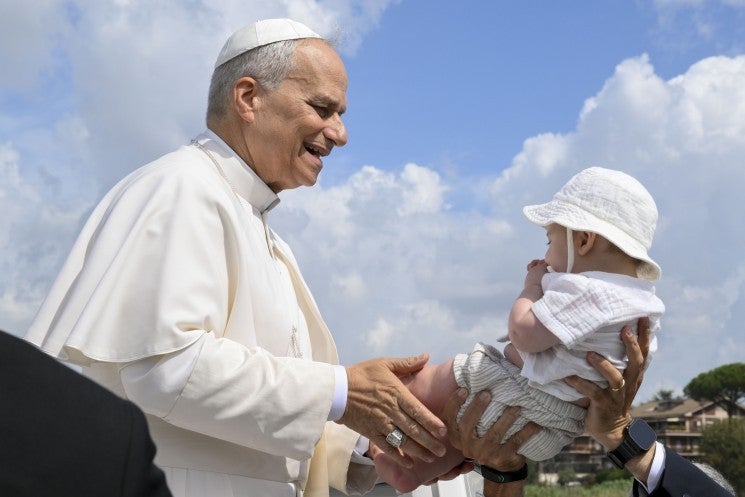 Camp Mystic alumnae and family sing after a memorial service on July 7, 2025, honoring victims of the flash floods in Central Texas over the Fourth of July weekend. / Credit: Amira Abuzeid/CNA
Camp Mystic alumnae and family sing after a memorial service on July 7, 2025, honoring victims of the flash floods in Central Texas over the Fourth of July weekend. / Credit: Amira Abuzeid/CNA
Houston, Texas, Aug 4, 2025 / 06:00 am (CNA).
One month has passed since some of the deadliest and most destructive flooding in the state’s history took at least 136 lives in the Texas Hill Country over the Fourth of July holiday weekend.
Of the confirmed dead, 108 were in Kerr County, where the worst flooding occurred, and included 36 children, 27 of whom were attending Camp Mystic, a Christian all-girls summer camp on the banks of the Guadalupe River.
After extensive recovery efforts by local, state, federal, and international teams, as well as thousands of volunteers, most of the missing have been recovered or confirmed safe. Two people remained missing as of July 28, according to Kerr County commissioners. Kerr County Judge Rob Kelly said the county’s “primary goal is closure for the families” whose loved ones are still unaccounted for.
The Church’s response
As cleanup and rebuilding continue one month later, Catholic Charities of the Archdiocese of San Antonio Vice President of Programs Lizzy Perales told CNA the nonprofit will continue to help flood victims “as long as it’s needed.”
“It will take years for people to rebuild their lives,” Perales said.
At the request of San Antonio’s archbishop, Gustavo García-Siller, Catholic Charities was deployed immediately after the flood to assist the parish in Kerrville, Notre Dame Catholic Church.
Since then, the nonprofit has three staff on site who are providing case management services, coordinating help for victims’ material needs, including emergency and longer-term housing and financial assistance, as well as mental health counseling and legal support.
Catholic Charities also has a distribution site that has served over 450 people with hygiene items, food, water, cleaning supplies, baby items, and “anything families who have lost everything need,” Perales said.
In the immediate aftermath of the flood, the distribution site also provided aid to first responders in the form of food, electrolytes, tools, gloves, and small equipment.
Catholic Charities is assisting with emergency shelter and temporary lodging through a partnership with home rental company Airbnb. It has also assisted in the cost of several funerals in recent weeks.
Perales told CNA she is grateful for the many donations both Catholic Charities and Notre Dame Church have received in the last month. She said the recovery effort has been an ecumenical affair.
“We have worked with many other great organizations and collaborated with many other churches and faith leaders,” she said. “We all want to be good stewards and not duplicate our efforts.”
She asked for continued prayers for the victims as well as the many volunteers and relief workers.
Record rainfall led to the historic floods
The historic flooding began in the early hours of July 4 after record rainfall, with some areas receiving up to 15 inches. Hunt, a small town in Kerr County located near the headwaters of the Guadalupe River, received 6.5 inches in three hours, leading to the river rising 26 feet in 45 minutes and 33 feet in two hours.
Though most of the devastation occurred along the Guadalupe, the San Saba, Frio, and Colorado rivers also flooded as the same storm system moved across the area.
The immense volume of water caused the rivers to overflow their banks, tearing homes from their foundations and sweeping away RVs, cabins, cars, and trees. Many awoke to find quickly-rising water in their homes or cabins, and survivors had to act quickly to escape.
Emergency response and warning systems
On July 3, ahead of an expected storm system, state officials held an emergency weather briefing in which they were warned there was a “minor” possibility of flash flooding in Kerr and surrounding counties. Due to the unexpectedly high volume of rainfall, at 1:14 a.m. on July 4, the National Weather Service issued a flash flood warning that included the towns of Kerrville, Ingram, and Hunt. The warning was escalated to an “emergency” at about 4:20 a.m., but by then, the river had already risen higher than 20 feet in some places.
The National Weather Service did not issue a flash flood emergency in Kerrville until 5:34 a.m.
Many have criticized delays in emergency alerts and the lack of a flood warning system in the area, known as “Flash Flood Alley,” blaming officials from Camp Mystic leadership, the county, the state, FEMA, all the way up to President Donald Trump.
In 2016, then-Kerr County commissioner Tom Moser said in a commissioners’ meeting: “I think that this area is one of the highest probability areas for flash floods that exists, OK — probably within, I don’t know, within the nation, but certainly within the state.”
However, after multiple attempts over several years, Kerr County failed to secure state or FEMA funding for flood warning systems.
Camp Mystic had just passed an inspection by the Texas Department of State Health Services on July 2, which certified that the camp had an emergency and evacuation plan in place for disasters, including flooding.
Camp Mystic is divided into two sections, and according to the inspection report, had 386 campers and 64 staff members at its Guadalupe River section and 171 campers and 44 staff at the newer, Cypress Lake section. All the victims, 26 girls and one counselor, came from the lower-lying Guadalupe River section.
A power outage around 4 a.m. that morning meant the camp’s public address system did not work, and no campers or counselors received text alerts because cellphones were prohibited while at camp.
Critics said the camp’s owners were irresponsible for continuing to operate the camp, even expanding it in recent years, knowing it was built on a flood plain. FEMA’s 2011 maps designated parts of Camp Mystic as a “Special Flood Hazard Area,” though some buildings were later removed from this designation after appeals by its owners, Tweety Eastland and her husband, Dick Eastland, who perished while rescuing campers during the flood.
Camp Mystic alumnae continue to fiercely defend the camp and the beloved Eastlands. Houston resident Mollie Osborne, who attended the camp as a girl and whose daughter had returned from a four-week session just before the July floods, said she will send her daughter back to the camp if it reopens next summer.
“The Eastlands are like family to us,” Osborne said. “And we trust them implicitly.”






















